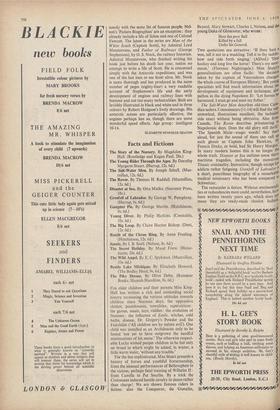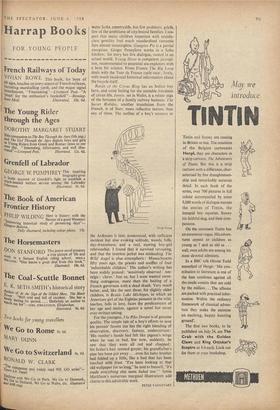Facts and Fictions
The Story of the Nursery. By Magdalen King- Hall. (Routledge and Kegan Paul, 28s.) The Young Rider Through the Ages. By Dorothy Margaret Stuart. (Harrap, 12s. 6d.) Jennie. By J. B. Snell. (Nelson, 8s. 6d.) The Pike Dream. By Olive Dehn. (Reindeer Books: Hamish Hamilton, 8s. 6d.)
FOR older children and their parents Miss King- Hall has written a rich and oustanding social history recounting the various attitudes towards children since Norman days, the oppressive clothes, punishments, moralities, superstitions : the games, meals, toys, riddles : the evolution of Nannies : the influence of Emile, witches, cold baths, disease, Dr. Gregory's Powder and the Fairchilds ('All children are by nature evil'). One child was installed as an Archdeacon only to be found 'not yet to have outgrown the needful ministrations of his nurse.' The otherwise respect- able Locke wished pauper children to be fed only on bread to which might be added, in winter, a little warm water, 'without any trouble.'
For the less sophisticated, Miss Stuart presents a history of horses and youthful horsemanship, from the unusual performances of Bellerophon to the vicious, perhaps fatal training of Wilhelm II: from Camilla to Pat Smythe. By a trick the Crotomans induced hostile cavalry to dance rather than charge ! We are shown famous riders in fiction: also the Conqueror, du 'Guesclin,
Bayard, Mary Stewart, Charles I, Nelson, and the young Duke of Gloucester, who wrote: Here lies poor Ball
Killed by a fall Under his General.
Two quotations are attractive : 'If thou hast a woe, tell it not to a weakling. Tell it to thy saddle' bow and ride forth singing.' (Alfred.) 'Drat hockey and long live the horse ! Them's my senti- ments.' (Florence Nightingale.) Miss Stuart's generalisations are often facile : 'the decision taken by the captain of Vaucouleurs changed the whole course of European History.' But young specialists will find much information about the development of equipment and technique; also pathos in the dying Napoleon II: 'Let horses be harnessed. I must go and meet my father.'
The Salt-Water Men describes old-time Cane' dian sailors. Connoisseurs (11-14) will find the veill, unworked, illustrations excellent, the technical side exact without being obtrusive. Also frog? Canada, The Rover describes privateering to Napoleonic days. Does the old glory still thrill? 'The Spanish Main-magic words! Say theca aloud, for just the sound of them can call IV such ghosts as Captain John Hawkins, Sir, Francis Drake, or bold, bad Sir Henry Morgan. In many modern homes this is no longer the whole truth. Disaster at Sea outlines some thirty maritime tragedies, including the monstrous Titanic criminality. Instructive, though except for addicts rather fatiguing. Grenfell of Labrador is a short, punctilious biography of a remarkable medical missionary who has been compared to Schweitzer. The remainder is fiction. Without sentimental]' ties or redundancies most could, nevertheless, have been written twenty years ago, which does tle`, mean they are ready-made classics. Indians, water larks, countryside, but few problems, griefs, few of the ambitions of city-bound families. I sus- pect that many children impatient with middle- class gentility find much standardised romantic fare almost meaningless. Gangster Pie is a partial exception. Ginger Pennylove works in a Soho kitchen: his story has live dialogue, rooted in an actual world. Young Diver is competent journal- ism, recommended to potential sea-explorers with a bent for science. From France The Big Loop deals with the Tour de France cycle race : • lively, with much incidental historical information about the bicycle itself.
Ranjit of the Circus Ring has an Indian boy hero, and some feeling for the unstable freedoms of circus life. Jennie, set in Wales, is a minor saga of the fortunes of a family railway business. The Secret Holiday, another translation from the French. is of liner, more reflective texture than any of these. The outline of a boy's summer in the Ardennes is taut, economical, with sufficient incident but also evoking solitude, woods, hills, day-dreaminess, and a real, moving boy-girl relationship. I found that it survived rereading, and that the tasteless jacket was misleading. The Wild Angel is also atmospheric : Massachusetts fifty years ago, the pranks and scuffles of four 'indomitable children.' The author's writing has been widely praised: 'sensitively observed : nos- talgic: clever.' Just so, but I soon wanted some- thing outrageous, more than the baiting of a French governess with a dead skunk. Very much better, and, like the next three, for slightly older children, is Beside Lake Michigan, in which an American girl of the Eighties pioneers in the wild, teaches, falls in love, faces the predicaments of her age and station, against a novel but never over-written setting.
For the youngest, The Pike Dream is of genuine quality. The simple tale of a boy's efforts to save his parents' Sussex inn has the right blending of observation, discovery, fantasy, undercurrent : `His mother's hands had felt like pigeon's wings when he was in bed, but now, suddenly, he saw that they were all red and chapped : his father's hair seemed greyer; his grandfather's pipe has been put away .. . even his baby brother had folded up a little, like a bud that has been touched with frost. "I've been looking at that old wallpaper for so long," he said to himself, "it's made everything else seem faded too." ' Sonia Markham's numerous marginal illustrations add charm to this admirable work.
PETER VANSITTART











































 Previous page
Previous page